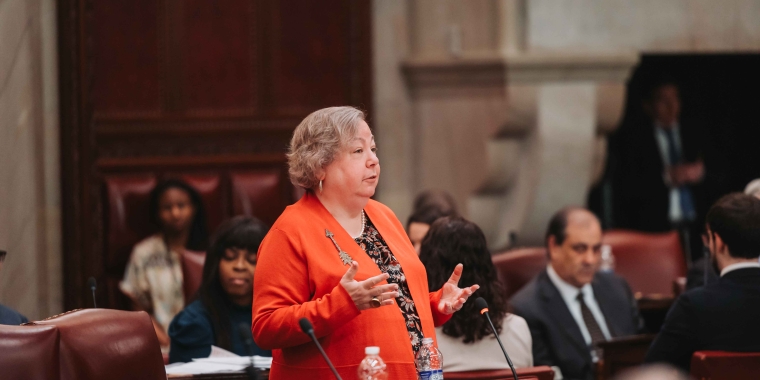
Mayor Koch, Senate “Heroes of Reform” Call on Senate to Pass NY Uprising Reform Bills as First Order of Business in January
Liz Krueger
December 20, 2010

For Immediate Release: December 20, 2010
Austin Shafran | austinshafran@gmail.com | 917-417-3711
Mayor Koch, Senate “Heroes of Reform” Call on Senate to Pass NY Uprising Reform Bills as First Order of Business in January
“Heroes” Unveil Comprehensive Reform Legislation to Fulfill NY Uprising Campaign Pledge and Commitments to Leading Civic Orgs
Bills on Ethics, Budget, Redistricting Part of Wide-Ranging Plan to Clean Up Albany
53 of 62 Members of Incoming Senate Signed Pledge Before Election
Former Mayor Ed Koch and members of the Senate unveiled a package of reform bills today that would fulfill the “New York Uprising Heroes of Reform” pledge, and called on the Senate to pass the comprehensive reform legislation as its first order of business in January.
The far-reaching bills on independent redistricting, meaningful ethics reform and responsible budgeting constitute a sweeping and much-needed overhaul of New York’s electoral, governmental and fiscal practices.
Senate Democrats are calling on all members of the Senate to join them in passing this legislative package as the Senate’s first order of business, keeping the promise of the New York Uprising pledge. The bills should be passed on the first day of session, before the Senate considers other legislation, the Senators said, because the Senate must undergo fundamental reform to be prepared to tackle the state’s many pressing issues.
The reforms will:
• End the gerrymandering of legislative districts to increase the number and quality of competitive elections.
• Strengthen ethics and disclosure laws and create an independent oversight commission to improve the standards of conduct and accountability for all elected officials.
• Take the politics out of budgeting to stop the practice of fiscal manipulation that encourages the state to spend more than it has.
Former NYC Mayor Edward I. Koch, founder of NY Uprising said, "I am delighted to join with these members of the New York State Senate in their announcement seeking to implement the pledges that New York Uprising supported in the recent legislative election and which they signed. Before the election, we urged all of the members of the legislature to pledge and announce their support for three key good government issues, including the appointment of an impartial commission to draw the new legislative and congressional lines; expanding ethics reform and requiring the adoption of a GAAP balanced budget. More than half of each body elected are now pledged to these reforms. In this coming year, these pledges have to be enacted into law. I will be working with the members of the legislature on a bi-partisan basis to make that all come about."
Senator Daniel Squadron (D-Brooklyn/Manhattan) said, “The first order of business in Albany this January must be reforming Albany. My colleagues and I signed the New York Uprising pledge because it includes measures that we’ve been fighting hard for—ethics reform, budget reform, and ensuring that the redistricting process is fair, open, and non-partisan. I urge all State Senators who signed the pledge to keep their word and join us in passing these important reform measures.”
Dick Dadey, Executive Director of Citizens Union said, “As January 1 approaches, CU is pleased that the vast majority of Senators taking office support an independent redistricting commission, stronger ethics enforcement, and fiscal reform. Most important, they recognize that there is an inherent conflict of interest in legislators drawing the districts they represent, and that honest and accountable government is best served when lines are drawn by an impartial body with ample opportunity for public input. Given the strong support that exists for this measure and other reforms, we look forward to working with the supportive Senators to turn their commitments into the policy of the state.”
Carol Kellermann, President, Citizens Budget Commission said, “These bills address serious problems in the State's budgeting process. Too much can be hidden or avoided under current budget procedures. A GAAP standard, performance measurement and reporting, and additional nonpartisan information developed by a legislative budget office would all be improvements that would increase transparency about the fiscal condition of New York."
Senator Liz Krueger (D-Manhattan) said, “New York needs to adopt practices that both put us on sound fiscal footing and allow us to better allocate funding based on program performance. Our current budget process allows shady accounting practices and encourages a model of non-accountability fin spending, revenues and borrowing. Either New York will break from these poor financial planning habits, or the budget process will break New York. Now that a majority of Senate members have signed on to these reforms, there is no excuse for delay or inaction.”
Senator David J. Valesky (D-Oneida) said, “The issue of redistricting will be critically important in the next two years. As the Senate sponsor of legislation that would create an independent, non-partisan redistricting model, I remain committed to working to pass legislation that will end partisan gerrymandering and enable constituents to choose their representatives, instead of the other way around.”
Senator Joseph Addabbo (D-Howard Beach) said, “Passing credible campaign finance reform legislation in Albany is warranted and long overdue. I look forward to an active discussion and subsequent passage of legislation that creates future campaigns that are clean, fair and transparent.”
Senator Michael Gianaris (D-Queens) said, “During the campaign, candidates of both parties tripped over each other to declare themselves reformers. Beginning on January 1st, we will find out who is a genuine Hero of Reform and who was just spouting empty political rhetoric. Better, more competitive elections breeds better government where the public interest comes before political incumbency.”
Senator-Elect Gustavo Rivera (D-Bronx) said, “For years, conflicts of interest have plagued Albany, making it difficult for state government to serve the public’s interest. By setting the strictest financial disclosure requirements our legislature has ever seen, we can ensure that our elected representatives work for the people and not themselves.”
Senator-Elect Tim Kennedy (D-58th District) said, “While we may differ on some issues, it appears we've now arrived at a common ground where the vast majority of senators want the same thing – a more responsible and less partisan Albany. We need to come together – Democrats and Republicans, upstate and downstate representatives – to clean up our government and move New York State forward. Across New York State, candidates for office promised voters that they would change Albany. Now, it’s time to deliver on our promises.”
Senator-elect Tony Avella (D-Queens) said. “For months, we heard reform rhetoric from candidates across the state. Well the election is over, and now it is time to stop talking and start acting. We can all agree that higher ethics standards, better budgeting practices and non-partisan redistricting are necessary for a brighter future in New York. So I ask that my colleagues – from both sides of the aisle - come together to enact this historic set of reforms and start moving our state in the right direction.”
Senator-Elect David Carlucci (D-Rockland) said, “My colleagues and I are calling on bipartisan support to keep the promise of the New York Uprising pledge and to pass this historic legislative package as the Senate’s first priority of the year. The residents of the 38th Senate District demanded reform and the plan we unveiled today will fulfill the ‘Heroes of Reform’ pledge signed by myself and 52 other Senators by ensuring independent redistricting, responsible budgeting and meaningful ethics reform.”
Summary of the Government Reform Package
Redistricting:
Independent Apportionment Commission: S1614B (Valesky/ Gianaris)
• Establishes an independent commission to propose and draw district boundaries for congressional and state legislative districts every 10 years following the U.S. Census.
• The district lines would be drawn to be compact, equal in population and contiguous; not abridge or deny minority voting rights; and align with local boundaries and community character to ensure the even-handed and non-partisan drawing of lines.
• Commission members could not currently hold or, in the past two years, have held elective or public office, been a lobbyist, been in a position within a political party, or be a relative or spouse of an elected or public official.
Budget:
Adoption of GAAP budgeting: S7284 (Krueger)
• Removes the ability for fiscal manipulation by requiring both the Executive Budget proposal and Enacted Budget to be balanced according to Generally Accepted Accounting Principles, which will fundamentally realign recurring spending with recurring revenue.
Legislative Budget Office: S4526 (Krueger)
• Creates a non-partisan Legislative Budget Office modeled after the Congressional Budget Office, which will remove the politics from revenue forecasting while ensuring funds are not hidden “off-budget” public authorities.
Commission to study performance based budgeting: S7259 (Krueger)
• Creates a 15-member Empire State Performance Commission tasked with designing a performance based management and budgeting blueprint to streamline government spending and end waste and fraud within programs and services.
Ethics:
Unitary Ethics Commission: S5738 (Squadron)
• Creates an independent and unitary Commission on Governmental Ethics, which would oversee both the legislative and executive branches.
• The Commission would consist of nine members, three of whom are chosen by the governor and one each chosen upon the recommendation of the comptroller, attorney general, senate majority leader, senate minority leader, assembly speaker and assembly minority leader.
• Members of the Commission are not allowed to be state or federal lobbyists or employed by political consulting firms, or the recipient of a state contract. The executive director would be chosen jointly by the Chair and Vice-Chair to serve a five-year term and not more than two consecutive terms.
Comprehensive Financial Disclosure: S382 (Rivera)
• Increases disclosure requirements on public officials by requiring that attorneys disclose their clients (unless doing so would violate a privilege or materially harm the client), creating new categories of value for reporting income, and requiring legislators to report business dealings with lobbyists.
Prohibit Contributions from those Doing Business with the State: S7478 (Addabbo)
• Prohibits corporations and other entities seeking or renewing government contracts from making direct and indirect political contributions, which could influence their ability to receive public funds for such a contract or renewal.



